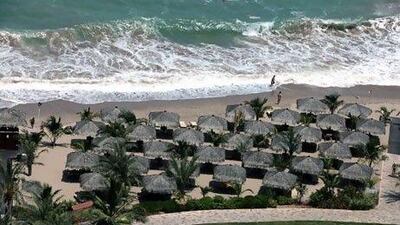The sweltering heat of a UAE summer usually drives many residents to seek cooler climes. But the country's popularity as a tourist destination during the baking hot months of June, July and August is growing.
Fact Box: Where's hot when it's hot
Dubai shopping Shopping centres were especially popular for summer tourists looking to escape the heat. Retailers reported that business was up on last year.
Ski Dubai The popular indoor ski resort in Mall of the Emirates offers activities including snowboarding and tobogganing. Ski Dubai attracts more than 750,000 visitors a year.
Summer in Abu Dhabi GCC families were the main target for the festival in the capital.It included offers by Abu Dhabi's attractions and hotels.
Fujairah A few degrees cooler than other parts of the Emirates, Fujairah was particularly popular as a "staycation" option for residents of the country. More than 400,000 visitors stay in the eastern emirate each year.
Water parks These amenities are growing in popularity as year-round attractions. Dubai's water parks are Jumeirah Group's Wild Wadi and Aquaventure. Ras Al Khaimah has the Iceland water park and Umm Al Qaiwain has Dreamland Aqua Park.
Major hoteliers in Dubai and Abu Dhabi have reported that business in the weeks outside of Ramadan was better than last year.
This was fuelled by low-cost deals, unrest in some countries in the Middle East and North Africa (Mena), and growth in tourism from emerging markets such as India and China.
"The tourist that comes for the summer is a very different person that comes to Dubai as a winter sun destination," says Brett Armitage, the senior vice president of sales at Atlantis, The Palm.
"The premium market to Dubai is still winter sun. But there is a market, particularly an aspirational one, that comes to Dubai during the summer because the prices are significantly less than they are during the winter months," he says. "The price really compensates for the weather. It appeals to a different audience that is prepared to come to experience the marvels of Dubai but in the summer are paying a lot less."
Although the Emirates may be uncomfortably hot, it is still appealing for European tourists, desperate to go home sporting a suntan after staying in five-star luxury.
Atlantis, which is Dubai's biggest hotel with 1,539 rooms, had average occupancy of 96 per cent during July. Room rates were up by 12 per cent compared with the same month last year.
"What we saw this year was much stronger demand," says Mr Armitage. "It's been an extraordinary summer."
The Emirates is also pulling in tourists from a wider range of countries, with the addition of flights by Etihad Airways, Emirates Airline and flydubai playing a huge role.
To illustrate the point, the number of Chinese tourists staying in Atlantis surged by 250 per cent in August, while the number of guests from India rose 25 per cent.
"The Chinese market does tend to be quite a price-sensitive market, so they are more susceptible to travel during the summer when the prices are lower," says Mr Armitage.
Hotels played their part in attracting more tourists during the summer by reducing prices.
Shopping festivals also attracted large numbers of GCC guests as they headed here for bargains and other attractions.
"International tourists came despite the summer and Ramadan as they usually do," says Mortiz Klein, the general manager of the Beach Rotana hotel in Abu Dhabi. "We have seen an influx in the city, and Abu Dhabi is getting stronger year on year."
The number of hotel guests in Abu Dhabi increased by 38 per cent in July, while total revenue grew by 6 per cent on the same month last year to Dh271 million (US$73.7m). Occupancy increased by 9 per cent to 65 per cent.
In Dubai, it was a similar story.
"Our properties in Dubai had a very good summer and Ramadan," says Essam Abouda, the vice president of operations for the Middle East and Africa at Hilton Worldwide. "We were running our own summer promotions … and had a strategic partnership with Emirates Airline for a campaign called Kids Go Free in Dubai, both of which helped attract guests and boosted business."
Even so, the occurrence of Ramadan in August this year had a major influence on travel trends.
Hoteliers reported a slowdown during the holy month as GCC guests returned home. But this also meant that June and July were exceptionally strong as tourists from the region took their holidays early.
Unrest in other destinations in the Mena region was another reason for increased occupancy rates here.
"Ramadan was slightly behind our expectations due to the fact that lots of GCC travellers stayed home," says Mr Klein. "However, international travel was not affected and performed well. Our main markets were the UK and German-speaking countries."
For many hotels, growing numbers of tourists from outside the GCC helped compensate for the drop-off in business during August.
"Summer was a story of two halves," says Arshad Hussain, the director of sales and marketing at the Fairmont Bab Al Bahr hotel in Abu Dhabi.
"Before Ramadan, we had a very strong summer for rooms and food and beverage. Ramadan was slow as expected for rooms business. But it was interesting to see that we received quite a few bookings from CIS states," he says, referring to the former Soviet republics now known as the Commonwealth of Independent States.
Growth in business from other European countries and Asia made up for the decline in the number of British tourists, who have traditionally favoured Dubai in the summer, Mr Armitage says.
The economic downturn in the UK was the major reason for the fall-off in numbers. "Dubai has seen a downturn out of the UK particularly and that's important because the UK is one of the main markets to Dubai."

